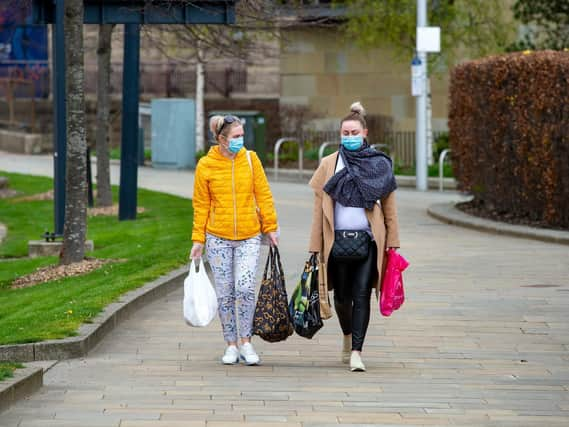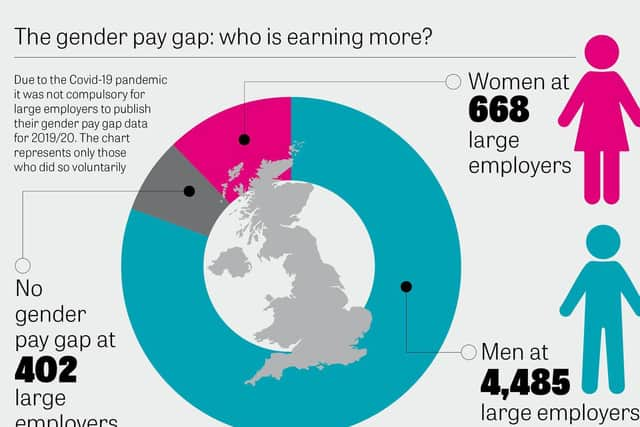Women in Northern England bearing 'brunt' of pandemic as Covid-19 has 'widened gender inequality' according to independent report


Nearly half of working women in the North (48 per cent) work in sectors which have been the most adversely affected by the coronavirus crisis, such as health and social care, hospitality and retail, while one in 10 have been furloughed at some point in the past year.
Figures from the Office of National Statistics (ONS) also show that there are currently 2.7m women in the North categorised as 'economically inactive', compared with just over 2m men.
Advertisement
Hide AdAdvertisement
Hide AdThe suspension of last year's gender pay gap reporting, unequal division of childcare and home schooling and rising reports of domestic abuse last year have also been highlighted by researchers as areas where gender equality has taken a step back.


The report published today (Wednesday) by independent think tank IPPR North has called on Government leaders to put gender equality at the heart of policies to build back after the pandemic.
It also outlines that women were more likely to work in public-facing jobs which cannot be done from home, such as care or retail, placing them at greater risk of contracting Covid-19.
Researcher Amreen Qureshi, who co-authored the report, said women in the North were experiencing "regional, economic, racial, and other inequalities – some all at the same time".
Advertisement
Hide AdAdvertisement
Hide Ad“Even before the pandemic, northern women – especially those in the most deprived communities – have seen their life expectancy fall after a decade of austerity. Women earn less, are more likely to be key workers and experience gender-based violence, and they take on a more significant responsibility for informal care," she said.


“There is no excuse for overlooking the impact of widening inequalities on women in the North. As leaders plan for recovery, we need deeds, not words, to build back fairer for northern women”.
Hannah Barham-Brown, who is Deputy Leader of the Women's Equality Party and is based in Leeds, called the report "depressing" but "unsurprising" reading, adding that inequalities were stemmed in women being more likely to work in "underpaid" jobs such as care or nursing.
She also said that one in four childcare providers were estimating they would have to close by the end of this year, and said ministers needed to treat this as a "priority", although the Government has defended its childcare policy.
Advertisement
Hide AdAdvertisement
Hide AdAccording to the report, 849,000 women in the North work in the health and social care industry, accounting for 23 per cent of working women but only six per cent of working men.


Ms Barham-Brown said: "I think it's a really tricky one to unpick and I'd love to see more research into why this is. If only six per cent of men are going into these industries then that's really stark.
"We need to be thinking about things like social housing and childcare provision. I think we need to ensure that the North is properly funded for this stuff.
"Central government has massively cut local council budgets and we know that a disproportionate amount of wider funding per head does seem to go to the South. That will have a knock-on impact on all these areas, which will then eventually fall worst on women – because all of this stuff generally does disproportionately impact women."
Advertisement
Hide AdAdvertisement
Hide AdA spokesman for the Government Equality Office said: An Equality Hub spokesperson said: "The contribution that women make to the economy is crucial. That is why we’ve set out an unprecedented offer of support which includes help for the sectors that women are more likely to be employed in, protection for female led start-ups and new childcare support.
"We understand it’s been a very difficult time for parents with childcare responsibilities and that is why we have introduced flexible furlough agreements and have extended the furlough scheme through to September, supporting employees who are struggling to work due to childcare.
"As the Minister for Women & Equalities made clear in her recent Fight for Fairness speech, this government is determined to tackle regional inequality and this will play a key role as we build back better."
Comment Guidelines
National World encourages reader discussion on our stories. User feedback, insights and back-and-forth exchanges add a rich layer of context to reporting. Please review our Community Guidelines before commenting.